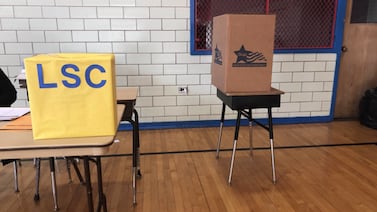Chalkbeat subscribers got this story early in their inboxes as part of Capitol Report. To get more legislative updates, plus education news from around the state delivered to your inbox Monday through Friday, sign up for our free email newsletter.
Thursday morning the Colorado State Senate signed off on a nearly $39 billion state budget without answering the big question Colorado educators and advocates want to know.
How much money will K-12 schools get?
Colorado’s constitution requires that K-12 spending increase every year by the rate of population plus inflation, but since the Great Recession, lawmakers have clawed back money for other priorities. This is the infamous budget stabilization factor, or B.S. factor.
This year the withholding was $321 million out of more than $8 billion in education spending. The proposed budget holds that constant for the next fiscal year. Another $321 million that won’t go to Colorado classrooms.
But that’s not the end of the story.
Joint Budget Committee Chair Rachel Zenzinger said the B.S. factor almost certainly will be smaller than outlined in the budget, but the changes will happen in the school finance act.
The state budget and the school finance act are the only two pieces of legislation the General Assembly must pass before adjournment.
In past years, lawmakers have left a placeholder in the budget to reduce the B.S. factor. This year that’s not necessary because lawmakers likely will draw from the state education fund. Right now there’s a lot of money in this fund, but that money won’t be replenished easily once it’s spent, especially if there’s a recession.
Using the state education fund is like using a savings account to pay for a new monthly bill. Short-term, it works. But the state’s obligated to keep funding education at whatever level it sets this year, plus inflation. Lawmakers will be weighing their risk tolerance against the urgency of increasing school funding, especially as federal pandemic relief money is running out.
Meanwhile, Republicans have kept up the pressure on Democrats.
Senate Minority Leader Paul Lundeen offered four unsuccessful amendments on the Senate floor to eliminate the B.S. factor entirely in this year’s budget using different combinations of reserves and expected new tax money.
Lundeen said lawmakers have failed to fully fund schools even as the state budget has nearly doubled since 2009.
“We’ve added 167 additional state programs,” he said. And unlike education, he said, “they’re not constitutionally mandated. They’re just good ideas that we show up to the party with as legislators.”
Zenzinger called Lundeen’s amendments “smoke and mirrors,” and said budget committee members are working on how to fund schools responsibly.
“It’s not because we don’t care about education, it’s not because we don’t want to properly fund education, it’s not because we don’t like teachers, and it’s not because we don’t see this as an essential function of government,” she said.
As written, Colorado’s $38.5 billion proposed budget would increase per student K-12 spending by 8.4% — an increase that barely keeps pace with inflation — and gives a boost to higher education while also allowing public colleges and universities to increase tuition by as much as 5%, the highest increase in the last five years.
The Senate did adopt a few amendments this week that touch on education, including $14 million for two grant programs that would pay for behavioral health care professionals and school counselors.
What’s next? Those amendments will get stripped out before the budget goes to the House, where representatives will start fresh and put their own stamp on the budget next week.
Then the Joint Budget Committee decides the actual form of the budget before sending it back to both chambers for a final vote. Charged with producing a balanced budget, they usually reject all amendments but occasionally include a few that have widespread support.
Jason Gonzales is a reporter covering higher education and the Colorado legislature. Chalkbeat Colorado partners with Open Campus on higher education coverage. Contact Jason at jgonzales@chalkbeat.org.








